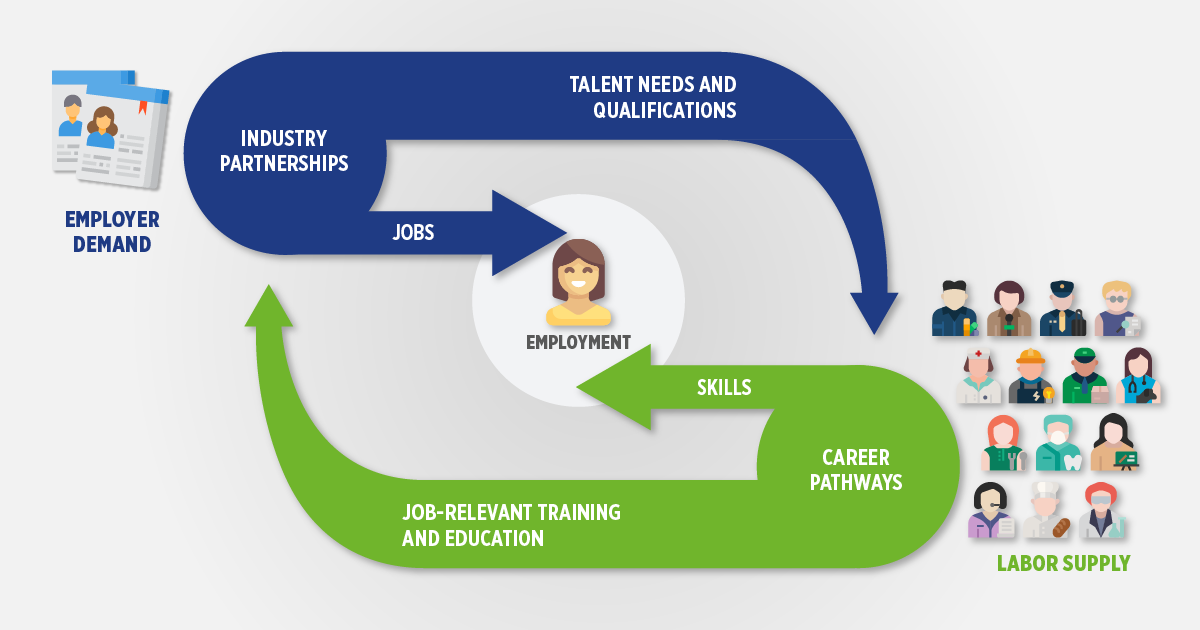Global labor market systems are undergoing big changes, most driven in part by the Fourth Industrial Revolution. The scope of these changes has driven a debate on the most effective ways to up-skill and re-skill the global workforce. This is particularly important with the emerging need for new digital skills that holds the promise of successful career transitions in the face of technological changes. One of the most successful approaches that countries have been using to bridge the disconnect in the education and training delivery systems are the Career Pathways Frameworks (CPFs). How are countries around the world implementing CPFs? What are the lessons learned for Latin America and the Caribbean?
What is a Career Pathway Framework?
As highlighted by the Alliance for Quality Career Pathways, CPFs are sequences of quality education and training offerings and supportive services that enable youth and adults to advance over time to higher levels of education and employment in a given industry sector or occupation. Many developed countries have begun looking at CPFs to improve skills or re-skill workers. CPFs require employers to work together more effectively and move from a focus on job placement to career progression.
The Jobs for New Yorkers Task Force (in New York, USA) is a good example of a CPF. Utilizing a demand-driven skill building approach, this initiative creates a coherent career pathway that is developed and endorsed by employers. By addressing the mismatches between labor market supply and demand in the economic sectors, industry-led partnerships provide feedback to employers to determine the skills and qualifications needs, inform upgrades to curricula, training, and credential attainment programs. This helps align education and training with local market conditions for a broad range of job seekers.

Asia and the UK are also starting to implement CPFs. In Singapore they are created from industry-led sectoral guides that inform decisions on education and training, career development and skills upgrade as part of the larger Industry Transformation Programme road map. In London, the city is pioneering the use of CPFs and industry partnerships to prepare those with basic qualifications for advanced training. Through the Skills for Londoners Taskforce, work has begun to modernize the industrial strategy. A green paper will inform career pathways for the under-skilled and technical learners. Basic digital skills training and creation of a capital fund for new technology institutes are also underway.
In our region, Jamaica is looking to CPFs as part of the solution to strengthen its skills development system in the Global Services Sector. Together with the IDB, the country is supporting the Global Services Skills Board, a high-level employer-led body with representation from across the sector and other key stakeholders. This group is working to set the priorities for skills development in the sector, develop an industry upgrade strategy, create a careers map showing pathways into and through the sector and an online marketplace for jobs and skills development, and establish a competitive fund for the prioritization of training plans to build a future talent pipeline for the sector.
What’s the relevance of the CPF in the future of work?
To develop a strategy to build the workforce of the future, we must first understand the right mix of skills. While there are a lot of uncertainties on the impact of innovative technologies on the future of work, job seekers will need to acquire soft skills such as critical thinking and better human interaction. They will also need to access information about what career paths are open to them. Throughout the world and in Latin America and the Caribbean, CPFs are helping industries and workers to map the required skills to be able to adopt new technologies and empower workers to embrace the adoption of technology.


Leave a Reply